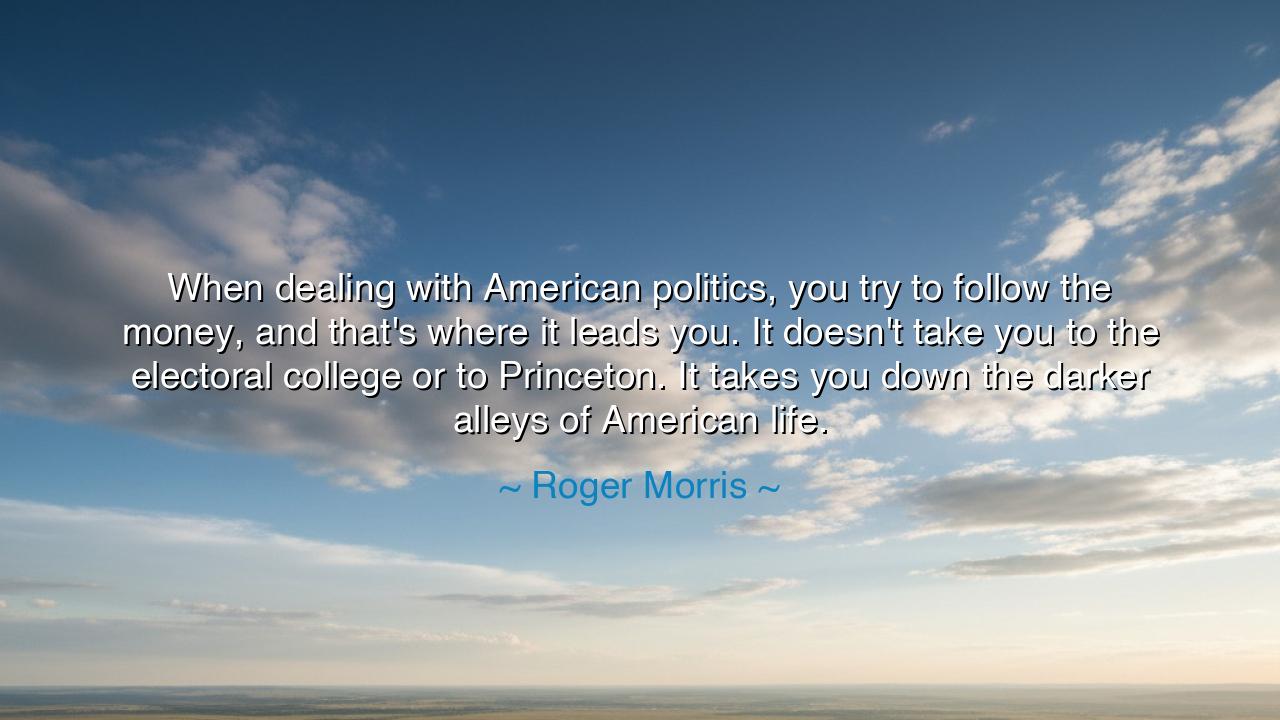
When dealing with American politics, you try to follow the
When dealing with American politics, you try to follow the money, and that's where it leads you. It doesn't take you to the electoral college or to Princeton. It takes you down the darker alleys of American life.






"When dealing with American politics, you try to follow the money, and that’s where it leads you. It doesn’t take you to the electoral college or to Princeton. It takes you down the darker alleys of American life." Thus spoke Roger Morris, unmasking the hidden machinery behind the glitter of democracy. His words pierce like an arrow, teaching that beneath the banners, debates, and noble speeches, money often drives the course of power.
The ancients warned of this same corruption. In Rome, votes were bought with coin, and offices secured through bribes. Cicero lamented that the republic was not guided by virtue, but by gold passed in secret. To follow the money was to see the truth—that senators swore by duty in public, yet sold their loyalty in private. So too in every age, the bright temples of politics often stand upon foundations laid in shadow.
History reveals this in the scandal of Watergate. At its heart was not simply burglary, but the hidden river of money that funded secret operations, propaganda, and influence. To understand the crime, investigators did not chase speeches or slogans—they followed the money. And it led, as Morris warns, not to noble halls of learning or lawful assemblies, but to hidden rooms where the darker alleys of power were revealed.
So too in our age, the influence of corporations, lobbyists, and secret donors whispers louder than the voice of the common man. While elections appear to turn on votes, often they are first tilted by the weight of gold. Thus the promise of equality is endangered, for when wealth rules, the poor are left voiceless. To see this clearly is to understand Morris’s warning: that American politics, like all politics, must be judged not by its words but by its flow of treasure.
Therefore, let this wisdom be carried forward: whenever you seek the truth of power, follow the money. It will not lead you to noble ideals alone, but to the places where corruption festers and bargains are struck. Yet knowing this is itself strength, for only by shining light into the alleys can the people reclaim what is theirs. Remember: gold may steer the hands of rulers, but truth, once awakened, can still break the chains of greed.






THNguyen Thanh Hien
At street level, this becomes very local: zoning decisions, procurement, sheriff races, school board contracts. I want a “neighborhood influence audit.” Steps: pick one public body; list its top five recent contracts; match contractors to donors; note any timing coincidences; and attend one meeting to ask a neutral, well-sourced question. Pair that with a buddy system to avoid burnout and a short debrief template for sharing findings. The goal isn’t gotchas; it’s building a habit of noticing where money nudges policy.
VALuong Viet Anh
Historically, financial influence morphs with each era’s loopholes. I’d love a comparative map of common pathways: direct contributions, independent expenditure groups, nonprofit conduits, consulting arrangements, and the revolving door into lobbying or media. What indicators suggest a shift—new industries showing up in ad markets, sudden growth in obscure committees, or recurring vendor names across rival campaigns? Offer a set of detective questions an attentive reader can apply across cycles, so the focus stays on structures rather than personalities alone.
PLphuong linh
Regulation-wise, I’m torn. Greater transparency seems obvious, but disclosure can chill participation or be weaponized. Where’s the line that maximizes sunlight without exposing small donors or volunteers to harassment? Propose a tiered system: real-time reporting for large sums, delayed or aggregated reporting for modest contributions, and clear labeling for political ads with an accessible archive. Add audit triggers based on risk rather than headlines. I’m looking for a balanced framework that protects speech while making influence legible in real time.
QPquyen Phan
Campaign coverage often tracks polls and gaffes; less airtime goes to the machinery that funds persuasion. As a media consumer, I want a standardized sidebar for every major race: top funders by category, concentration of donations, and the overlap between ad messages and donor interests. What would a trustworthy “funding scoreboard” look like, and how do we keep it from turning into caricature? Suggest a few interpretation rules—avoid guilt by association, look for patterns over cycles, and weigh small-donor share as one indicator among many.
SLvo sy luan
There’s a morale issue here. If financial pipelines steer outcomes, how do citizens avoid sliding into fatalism? I’d like a concrete action stack: support local watchdog journalism; prioritize small-donor models you can actually verify; attend budget hearings where contracts are awarded; and learn to file simple public-records requests. Could you sketch a monthly checklist for engaged but busy people, with time estimates and common pitfalls? I’m not hoping for purity—just a routine that steadily increases visibility where influence is quietly exchanged.